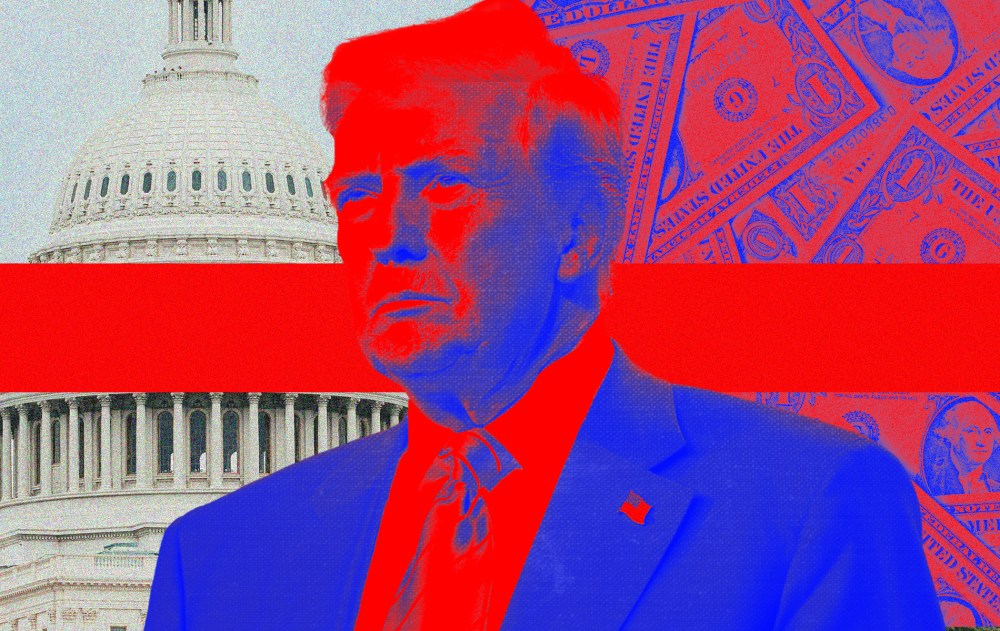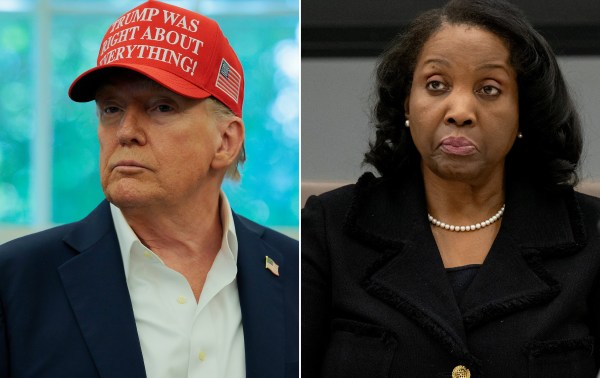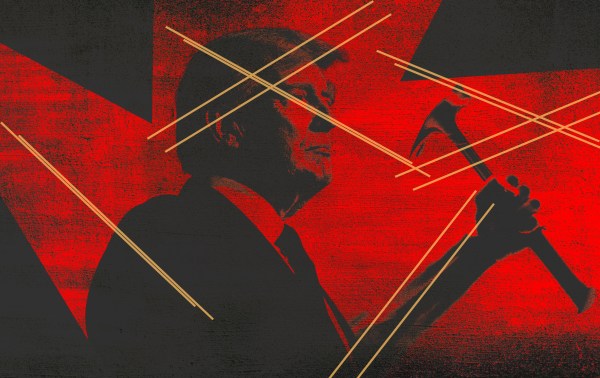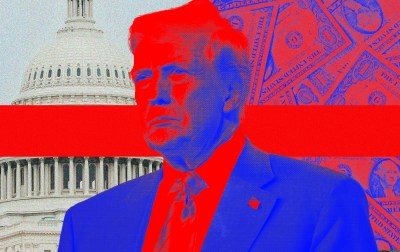We are sending today’s Boiling Frogs newsletter, normally reserved for paying members, for free. To make sure you receive the full version of Nick’s newsletter in your inbox five days a week, become a Dispatch member by clicking here.
The press is having fun today with the White House’s new timeline on bombing Iran. “I will make my decision whether or not to go within the next two weeks,” the president said Thursday in a statement.
Those fluent in Trump-ese know that “two weeks” doesn’t literally mean two weeks. On all sorts of looming policy decisions dating back to his first term, it’s what Donald Trump unfailingly defaults to whenever he has no idea what he’s going to do.
It’s “not a measurement of time so much as a placeholder,” the New York Times slyly explained. “Two weeks for Mr. Trump can mean something, or nothing at all. It is both a yes and a no. It is delaying while at the same time scheduling. It is not an objective unit of time, it is a subjective unit of time. It is completely divorced from any sense of chronology. It simply means later. But later can also mean never. Sometimes.”
Just as the cat in Erwin Schrodinger’s famous thought experiment both is and isn’t alive, “two weeks” both is and isn’t a deadline.
Yesterday also brought a new executive order suspending the federal ban on America’s favorite Chinese spy app, TikTok, for another 90 days. That ban passed the House and Senate last year by supermajority margins and has already been upheld by the Supreme Court. It allows the president to grant a one-time 90-day suspension, and even then only if he certifies to Congress that a sale of TikTok is in the works. Thursday’s order marked the third time Trump has delayed enforcement, and he’s made no certifications about a pending deal that I’m aware of.
It seems that the TikTok ban both is and isn’t binding federal law, both a yes and a no as to whether the company’s Chinese parent must divest.
“If the key consideration in whether a written statute will be followed is how the president personally feels about it, the rule of law in your country both does and doesn’t exist.”
Shrieking about authoritarianism tends to conjure dystopian tableaus of soldiers confronting citizens and masked agents snatching people off the streets. And, er, we do have that right now. But at heart, it’s a complaint about lawmaking authority migrating from the legislature to the executive. It fears that the president, not Congress, will functionally decide which laws govern the people. And it’s as much an abuse of power when he chooses not to enforce the law as it is when he enforces it too harshly.
The TikTok ban is the latest reminder that we’re living under Schrödinger’s presidency, where laws both do and don’t apply. Think of them as “suggestions” to the White House rather than binding instructions.
Policy doesn’t exist.
All modern presidents abuse their discretion.
Barack Obama, for example, chose not to enforce certain federal marijuana laws in states where the drug was legal and not to enforce immigration laws against illegals who came to the United States as children. In both cases, law professor Jack Goldsmith notes, he justified his policies “under the traditional criteria of policy priorities and resource constraints.” Federal money and manpower are limited, Obama argued, so he would devote them to punishing major violations of the law rather than minor ones.
In three ways, Trump’s abuse of executive discretion is distinct from that. It’s comprehensive, coloring every arm of policy. It’s unabashedly unjustified, typically lacking the fig leaf of “resource constraints.” And it’s chaotic, with the president often reversing himself and sometimes reversing himself again.
America in 2025 isn’t merely being governed by executive whim; it’s being governed by an executive whose whims are so fickle that, practically speaking, federal “policy” no longer exists. “Policy” describes a set of stable, cognizable rules that citizens are required to follow in governing their affairs. Under Trump, those rules remain technically in effect, but across an array of issues, it’s now anyone’s guess whether they will or won’t be enforced. They’re binding and not binding.
What, for example, is America’s “policy” on TikTok? According to the law Congress passed, the platform was supposed to have been delisted from app stores by now. Trump is refusing to enforce that, and there’s no pretense that he’s doing so because of some money or manpower issue. He’s cowed by the fact that TikTok is popular with young voters, and he wants to use the ban as leverage in trade negotiations with China—although it’s not clear what his policy is there either.
What’s America’s “policy” on tariffs? Years ago, Congress gave the president authority to impose trade sanctions and embargoes in case of a national emergency, but Trump has stretched that beyond recognition. He claims that that authority entitles him to impose tariffs (a word that doesn’t appear in the relevant statute); has alleged, absurdly, that trade deficits are per se emergencies; and abused his discretion by simultaneously levying nearly every country on Earth. Then, a week later, he “paused” all of it for 90 days—except for China—and is poised, à la TikTok, to extend the “pause” again.
There are many laws on the books governing tariffs in the United States. How confident should an American feel at this point about relying on any of them in formulating a business or investment strategy?
Absolute discretion.
You might assume that Trump would be consistent in enforcing immigration law, at least, as it’s the issue about which he’s always felt most passionately. But no.
It was only four days ago that I addressed his remarkable about-face on ICE raiding farms, factories, and restaurants to arrest illegal-immigrant workers. Initially, the administration prioritized deporting violent criminals; then Stephen Miller expanded the targets to nonviolent laborers; then Trump, under pressure from business interests, overturned that expansion; and then on Tuesday, the White House overturned that and reinstated Miller’s guidance.
That chaos isn’t due to “resource constraints.” How could it be when the president came into office promising to deport America’s illegal population en masse? It’s due to Trump ping-ponging in how he uses his discretion to enforce the law depending upon which constituency happens to be in his ear. When farmers are complaining to him, it’s hands-off America’s fruit pickers; when MAGA is complaining to him, no illegal immigrant is safe.
There is no “policy.” If you employ illegal immigrants, they are and aren’t at risk of being pulled off the job by ICE.
You can hop from one Trump program to another and find similar examples of laws sort of existing and sort of not. Some are obscure, like the State Department claiming the power to dissolve an agency like USAID despite the fact that only Congress is lawfully authorized to do that. Others are sensational, like the president decreeing that laws penalizing people for beating cops shouldn’t apply to those who do so for his personal benefit.
In some cases, there are global consequences. For instance, his “two weeks” timeline for Iran takes for granted that he has legal authority to send the U.S. military into combat absent a national emergency. He does not, as members of Congress in both parties would tell you. But since we all understand that they lack the guts to try to stop him, he … kind of does?
As for Russia, another recipient of the “two weeks” punt, Trump is so eager to wield complete control over U.S. policy that he’s asked Senate Republicans to rewrite the sanctions bill they’ve been cooking up. Instead of the legislation ordering economic penalties on Moscow, the president wants it to—ta da—give him authority to impose sanctions instead. The crackdown on Putin is coming! But also, maybe it’s not.
The only example I can think of where he’s done things by the book and tried to enact a real, durable, you-can-look-it-up policy is with the One Big Beautiful Bill that’s percolating in Congress. But even there, there’s less than meets the eye. Any spending that the House and Senate authorize in that legislation might end up being withheld by the president in his absolute discretion, through the unconstitutional magic of impoundment. Were that to happen, Congress would retain the power of the purse nominally, but not actually.
If the key consideration in whether a written statute will be followed is how the president personally feels about it, the rule of law in your country both does and doesn’t exist. That’s where we are now. Schrödinger’s presidency!
Why don’t Americans care?
Slop.
They should care. Republicans too, if only as a matter of self-interest. Goldsmith peered into his crystal ball:
For Republicans who abhorred Obama’s more modest but still-aggressive uses of enforcement discretion yet who today sit on their hands as President Trump wields a more aggressive power, the bite will come when the next Democratic administration invokes the Trump administration’s TikTok non-enforcement as justification for not enforcing, or for wiping out the effects of, all manner of laws that Republicans love but Democrats despise.
Democrats have already begun to play that game, first with the Obama examples that I mentioned earlier and more recently with Joe Biden’s outrageous attempt to relieve his college-grad base of their student debt. But if Obama’s actions stand for the proposition that “some laws are optional based on resource constraints” and Biden’s actions stand for the proposition that “some laws are optional based on whether my voters like them,” Trump’s actions are more a matter of “all laws are optional based on whether I like them.”
That’s the logic Democrats will exploit when they’re back in power, and it’s why Republicans won’t relinquish power without a fuss the next time they lose an election. You don’t go about turning laws into suggestions and then graciously stand aside to see what your opponent might do with that.
So I repeat: Why don’t Americans care about what Trump is doing with TikTok? He’s breaking the law flagrantly and setting an atrocious precedent in so doing.
If that isn’t enough, his Schrödingerian approach to matters like tariffs and immigration also has major economic downsides. Businesses can’t build on policy ground that keeps shifting under their feet, and each new indefensible executive exemption invites further indefensible exemptions on grounds of “fairness.” Imagine the Justice Department trying to explain why it cracked down on some American company accused of malfeasance after its boss granted one reprieve after another to an honest-to-goodness Chinese communist propaganda platform.
“Where’s the outrage in America? Where’s the outrage?" Bob Dole famously asked in 1996, a few decades before he became a self-described “Trumper.” Well, where is it?
I batted that question around this morning with a few Dispatch colleagues, and one thought the answer was simple: Americans love slop!
By “slop,” he meant policies that the public likes and insists on preserving despite the obvious long-term risk they pose to the country. America loves going catatonic for hours at a time while scrolling through China’s spy app—or many millions of us do, anyway. (Adults are evenly split on banning TikTok.) America loves loves loves Social Security and Medicare, too, even though those programs are driving us to fiscal ruin. And America quite likes illegal immigrant labor, and I don’t just mean business owners eager to save a buck. A Gallup poll taken last summer in the thick of the campaign found 70 percent supported letting “the undocumented” become citizens, provided that they met certain legal requirements.
“I suspect many Americans sincerely do not understand anymore how the federal government is supposed to operate.”
You’ll get no argument from me about the “slop” theory. Calling Americans ignorant, spoiled, shortsighted, and corrupt is my love language. It’s the foundational belief of this newsletter. The TikTok fiasco illustrates it so vividly, in fact, that it plays like satire of how far our country has fallen. Imagine 20-somethings in the U.S. tuning into Tokyo Rose every night in 1945 and then whining until FDR agreed not to enforce a statute banning her from the airwaves. Encouraging the president to break the law so that you can continue mainlining enemy propaganda is proof of terminal late-stage civic decadence.
But I do think there’s a little more to Schrödinger’s presidency than an insatiable appetite for slop.
Frog boil.
It’s also a matter of expectations.
Americans have spent many years, under administrations staffed by members of both parties, watching responsibility for policymaking shift from the legislature to the executive (and the judiciary). They’ve gotten used to the White House spearheading major legislation, especially when the president’s party controls the House and Senate. Even when Congress does take initiative, bills routinely originate from the leadership of the majority party instead of organically through collaboration among lawmakers via regular order.
No wonder the legislative branch now attracts so many political performance artists. There’s nothing else to do there but perform. And no wonder that the average Joe no longer blinks when the president chooses to ignore a TikTok ban that passed both chambers overwhelmingly. Why wouldn’t he? Hasn’t Congress’ role in government been essentially advisory for years?
I’m not being arch in saying that. I suspect many Americans sincerely do not understand anymore how the federal government is supposed to operate.
A second colleague confirmed that anecdotally. He told me he’s had conversations with five or six different friends recently in which he’s felt obliged to explain why the courts have anything to do with the president’s immigration crackdown. “Why do judges care what the president does on immigration?” one asked him, apparently in earnest.
Can you blame him? I strongly suspect that the president himself wonders the same thing.
What we have here, I fear, is an old-fashioned frog boil. Americans have been so conditioned to expect unchecked executive action by the cult of the presidency and corresponding disgrace of our apathetic Congress that many of them must be sincerely mystified upon being told that Trump is acting lawlessly. Younger Americans in particular would have no frame of reference for the proper separation of powers, particularly after growing up MAGA. Even if they did, what other conclusion could they draw from last November’s outcome except that most Americans don’t care about such things anymore?
Within my own Trump-supporting family, the most excitement I’ve witnessed over policy this year had to do not with the One Big Beautiful Bill in Congress but with Trump rescinding Biden’s executive orders seriatim in his first days back on the job. And that makes sense: It’s how most policy is made in the United States now.
If an appetite for “slop” fully explained the public’s apathy over how Trump has handled TikTok, there would be more of a backlash over his power grabs on trade. Tariffs aren’t popular, after all, and they’re doing a lot of financial damage to an awful lot of business owners. But Americans aren’t up in arms about him grossly abusing a trade statute designed for national emergencies because they don’t realize that they should be. All the frogs have boiled.
Schrödinger’s presidency has been a long time coming, and now it’s here.







Please note that we at The Dispatch hold ourselves, our work, and our commenters to a higher standard than other places on the internet. We welcome comments that foster genuine debate or discussion—including comments critical of us or our work—but responses that include ad hominem attacks on fellow Dispatch members or are intended to stoke fear and anger may be moderated.
With your membership, you only have the ability to comment on The Morning Dispatch articles. Consider upgrading to join the conversation everywhere.